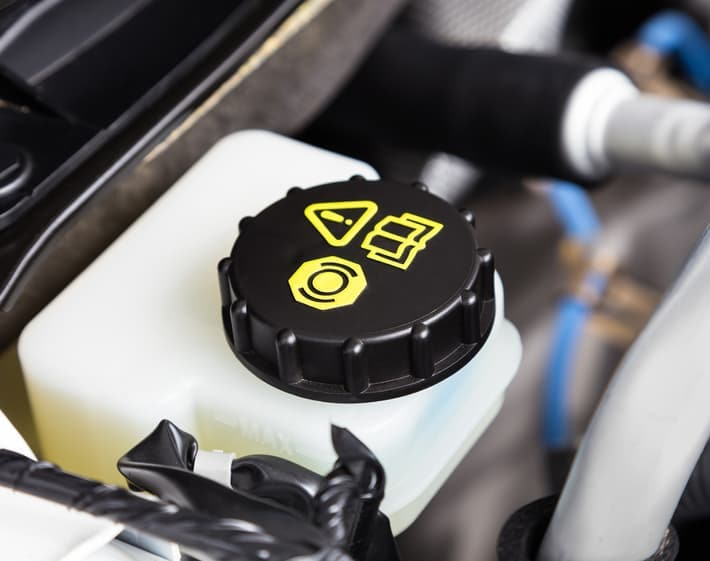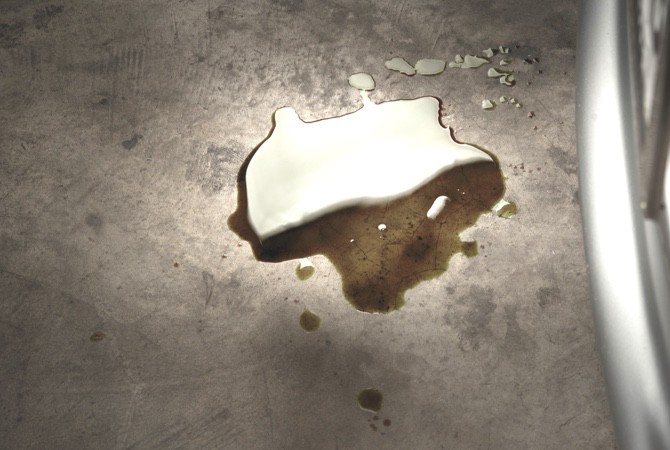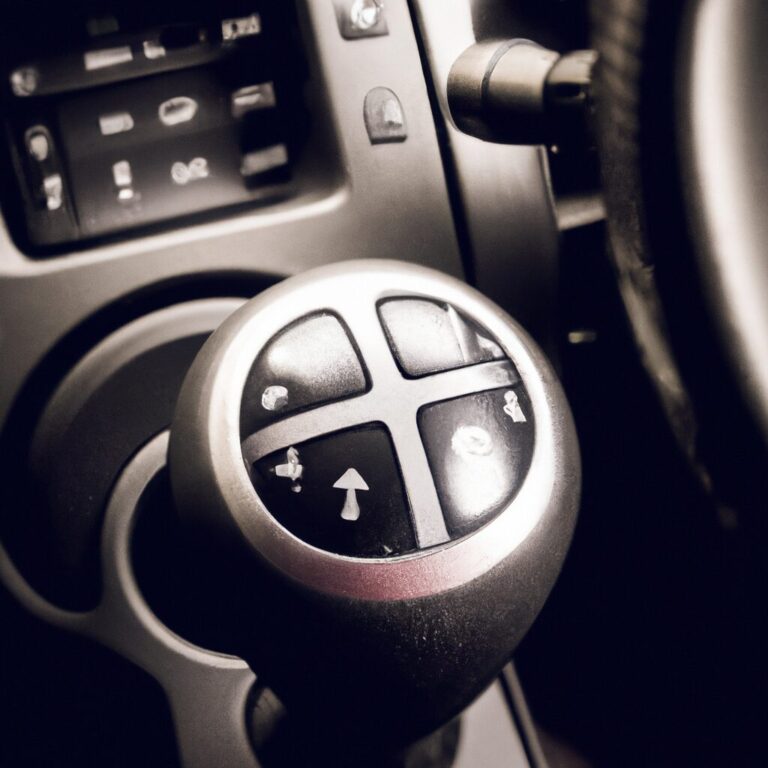How to Tell If Brake Fluid is Leaking
To identify brake fluid leaks, check for puddles under the car and low fluid levels in the reservoir. Brake fluid leaks can lead to decreased braking performance and should be addressed promptly to ensure safety and prevent further damage to the vehicle.
By understanding the signs of brake fluid leaks, you can take proactive steps to maintain the integrity of your braking system. We will delve into the common causes of brake fluid leaks, how to diagnose them, and the necessary steps to fix the issue.
Stay informed and empowered to keep your vehicle safe on the road by learning more about detecting and addressing brake fluid leaks effectively.
Signs Of Brake Fluid Leak
Signs of Brake Fluid Leak:
Visible Puddles Under The Car
Brake fluid leaks may manifest as visible puddles underneath your vehicle.
Spongy Or Low Brake Pedal
A spongy or low brake pedal can indicate a potential brake fluid leak.

Credit: www.tiresplus.com
Locating The Source Of The Leak
Checking for brake fluid leaks is crucial for maintaining your vehicle’s safety. If you suspect a leak, the first step is to locate the source to prevent further damage.
Check Brake Master Cylinder
Inspect the brake master cylinder for any signs of leakage at the base or around the cap seal.
Inspect Brake Lines And Calipers
Examine brake lines and calipers for any wet spots or visible signs of brake fluid leaks.
Potential Dangers Of A Brake Fluid Leak
When it comes to the potential dangers of a brake fluid leak, it’s crucial to be aware of the risks it poses to your vehicle’s safety and performance. Let’s delve into the possible hazards of a brake fluid leak and the signs to look out for.
Loss Of Braking Power
One of the primary risks associated with a brake fluid leak is the potential loss of braking power. When brake fluid is leaking, it compromises the hydraulic pressure within the braking system, leading to decreased brake responsiveness and effectiveness. This can result in longer stopping distances, making it challenging to safely bring your vehicle to a halt, especially in emergency situations.
Risk Of Brake System Failure
Another critical danger of brake fluid leakage is the increased risk of brake system failure. As the fluid level decreases, it can lead to air entering the brake lines, causing air pockets that compromise the system’s ability to generate sufficient braking force. This poses a significant safety hazard as it can lead to potential total brake failure, putting the driver, passengers, and other road users at serious risk.

Credit: gandgautorepair.com
How To Address A Brake Fluid Leak
When it comes to maintaining your vehicle’s safety, ensuring the brake system is in top condition is crucial. A brake fluid leak can compromise your car’s ability to stop effectively, making it essential to address the issue promptly. In this section, we will discuss how to repair the leak and refill and bleed the brake system to restore its functionality.
Repairing The Leak
A brake fluid leak can occur due to various reasons such as damaged brake lines, caliper failure, or a deteriorating master cylinder seal. It is important to identify the source of the leak before proceeding with any repairs. Here are the steps you can take to fix a brake fluid leak:
- Locate the leaking area by visually inspecting the brake lines and components.
- If you discover a damaged brake line, it may need to be replaced. Ensure you have the necessary tools and equipment to safely perform the replacement.
- If the leak is originating from a caliper, it might be necessary to rebuild or replace the caliper altogether.
- An old or deteriorated master cylinder seal can also lead to brake fluid leakage. In such cases, replacing the seal should resolve the issue.
- After completing the repairs, double-check for any remaining leaks and ensure all connections are secure. Test your brakes to confirm that they are functioning correctly.
Refilling And Bleeding The Brake System
Once the brake fluid leak has been repaired, it is essential to refill and bleed the brake system. This process ensures that there is no air trapped within the system, which can affect the performance of your brakes. Follow these steps to refill and bleed your brake system:
- Gather the necessary tools, including a brake fluid reservoir, fresh brake fluid, a wrench, and a brake bleeding kit.
- Remove the reservoir cap and use a clean cloth or towel to wipe away any dust or debris.
- Fill the reservoir with the recommended type of brake fluid, making sure not to overfill.
- Locate the brake bleeder valve on each wheel, starting with the furthest one from the master cylinder.
- Attach the brake bleeding kit to the valve, following the manufacturer’s instructions.
- Have a helper slowly press the brake pedal while you open the bleeder valve. Allow fluid and any trapped air to escape.
- Close the bleeder valve once fluid begins to flow consistently without bubbles.
- Repeat this process for each wheel, proceeding from the furthest to the closest to the master cylinder.
- Keep an eye on the brake fluid reservoir and refill it as needed during the bleeding process.
- Once all wheels have been bled, test your brakes to ensure they feel firm and responsive.
By following these steps, you can address a brake fluid leak effectively and restore the integrity of your vehicle’s braking system. Remember, if you encounter any difficulties or are unsure about performing the repairs or maintenance yourself, it is always recommended to seek assistance from a professional mechanic.
Preventing Future Brake Fluid Leaks
Brake fluid is a critical component of your vehicle’s braking system. It facilitates the transfer of force from your foot on the brake pedal to the brake calipers, enabling your car to slow down or come to a complete stop. However, brake fluid leaks can compromise the performance and safety of your brakes. In this section, we will explore ways to prevent future brake fluid leaks to ensure your vehicle’s continued safety.
Regular Brake System Inspections
Regular inspections of your brake system are crucial for identifying any potential leaks early on. Periodically inspect the areas around your tires and under the car for any signs of fluid leaks. If you notice any drops or puddles of fluid, it may indicate a brake fluid leak. Another tell-tale sign of a brake fluid leak is the presence of a sweet, burnt smell when your car is in motion or parked. If you experience these symptoms, it is vital to get your brakes inspected by a qualified mechanic as soon as possible.
Using The Correct Brake Fluid
Using the correct brake fluid not only ensures optimal brake performance but also helps prevent leaks. Always refer to your vehicle’s manual to determine the recommended type of brake fluid for your specific make and model. Here’s a quick breakdown of the different types of brake fluids:
| Type of Brake Fluid | Description |
|---|---|
| DOT 3 Brake Fluid | Standard brake fluid suitable for most vehicles |
| DOT 4 Brake Fluid | Higher boiling point than DOT 3, ideal for heavy-duty vehicles or those exposed to high temperatures |
| DOT 5 Brake Fluid | Silicone-based brake fluid suitable for certain classic or high-performance vehicles |
Using the wrong type of brake fluid can lead to system malfunction and potential leaks. When topping up or changing your brake fluid, ensure you are using the correct type as specified by your vehicle’s manufacturer.
By regularly inspecting your brake system and using the correct brake fluid, you can significantly reduce the risk of future brake fluid leaks. Maintaining a healthy brake system not only ensures your safety on the road but also extends the lifespan of your vehicle’s braking components. Take the necessary steps to prevent leaks, and be proactive in maintaining your brakes for a smoother and safer driving experience.

Credit: www.wagnerbrake.com
Frequently Asked Questions Of How To Tell If Brake Fluid Is Leaking
How Do You Know If You Have A Brake Fluid Leak?
Check for fluid near the wheels or under the car. Look for a low brake fluid level. Feel for spongy or soft brake pedal. If there’s any sign of leaks or low fluid, get it checked by a professional.
Can You Drive With A Brake Fluid Leak?
Driving with a brake fluid leak is dangerous as it can lead to loss of braking power. Address the issue immediately to ensure safety on the road.
Does Brake Fluid Leak When Car Is Off?
Brake fluid can leak when the car is off due to a damaged brake line or seal. Prompt repair is crucial.
Is It Expensive To Fix A Brake Leak?
Fixing a brake leak can range from $100 to $1,000, depending on the cause and severity. Regular maintenance and prompt repairs can help prevent expensive issues later on.
How Do You Know If Your Brake Fluid Is Leaking?
If you notice a sudden decrease in brake fluid levels or see dampness near the tires, it’s likely a brake fluid leak.
What Causes Brake Fluid To Leak?
Brake fluid can leak due to worn-out brake lines, damaged seals in the master cylinder, or a faulty brake caliper.
Is A Brake Fluid Leak Dangerous?
Yes, a brake fluid leak is dangerous as it can lead to reduced braking power, resulting in longer stopping distances and potential accidents.
Conclusion
To sum up, being able to recognize signs of brake fluid leakage is crucial for maintaining the safety of your vehicle. Regular inspection and prompt action can prevent potential accidents and costly repairs. By staying vigilant and addressing any issues immediately, you can ensure that your brakes remain in optimal condition, keeping you safe on the road.

